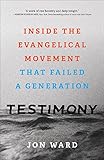In an episode of NBC’s sitcom The Office, Michael Scott offers a humorously self-serving accounting of his weaknesses as a boss: “I work too hard, I care too much, and sometimes I can be too invested in my job.” Asked to list his strengths, he replies, “Well, my weaknesses are actually strengths.”
Testimony: Inside the Evangelical Movement That Failed a Generation
Baker Pub Group/Baker Books
256 pages
$11.11
Call it the Michael Scott paradox. In telling stories about our lives, we have a habit of casting ourselves as the hero. Every day is a new chapter confirming that we alone are truly empathetic, courageous, and reasonable. Our strengths are obvious (or at least they should be). And our weaknesses are really strengths.
This penchant for valorizing our choices and motivations speaks to the fundamental fallenness of our nature. It tempts us to misremember, misconstrue, and misunderstand not only ourselves but those around us. This is the peril of spiritual-transformation memoirs such as Testimony, a new book from Yahoo News political reporter Jon Ward. Few things are as compelling and as invulnerable to disputation as a great personal story. And yet few things can slip away from the teller’s grasp as quickly or as totally.
Too often, Ward’s book succumbs to this latter tendency. Its subtitle (Inside the Evangelical Movement That Failed a Generation) promises a sweeping analysis of a religious community and a postmortem on that community’s fall from grace. And traces of this are sprinkled throughout the book, especially in its depiction of a church culture that prizes performance over grace.
But as a whole, Testimony struggles to overcome the Michael Scott mindset. Its memories of a conservative evangelical childhood are tainted by retroactive moralizing. Testimony is not so much a portrait of an evangelical movement as a snapshot of one evangelical’s attempt to process his past. As such, its lessons for readers are less about the dangers of institutions and beliefs out there than about the inner workings of our own hearts.
Testimony begins the way many testimonies do: at home. In the first several chapters, Ward narrates a childhood and adolescence spent within a conservative evangelical church culture anchored by his parents, especially his father (one of the few religious mentors the book portrays in a positive light). Many readers who grew up in conservative Christian settings will see familiar sights. Ward goes to church a lot; he and his siblings groan during family devotions and are kept away from alcohol and profanity.
The way Ward describes these mundane details is sometimes strange and off-putting. In one anecdote, he rebukes his pastor-father, who asks him to “participate more enthusiastically” in church: “I spoke up. ‘Dad, you’re just telling me to do that so you’ll look good to other people.’ To my dad’s credit, he admitted I was right and left me alone.” This exchange may be meant to convey something of the author’s youthful incisiveness, but I read it with grief. Perhaps Ward’s father genuinely wanted his son to take more joy in spiritual things. Could there have been more to this story?
This is unfortunately the beginning of a pattern that persists throughout Testimony, one marked by the absence of self-critique and a tendency toward assumption. In one especially miscalculated passage, he describes watching his mother play piano, which was “one of the few things I remember Mom doing for herself. … Gradually, any hopes and dreams she might have had for a life of her own, even a hint of something she could call hers outside of raising us kids, kept getting smaller.”
This comment, of course, expresses Ward’s concerns regarding traditional gender roles. But it struck me as misguided because Ward’s mother is not a subject in the book. She never speaks, and there’s no indication that his conclusion about her quiet desperation is fair or true. Too much of Ward’s memoir seems filled with unresolved tension between a son and his parents, and the lack of meaningful self-doubt gives it a revisionist vibe.
As Ward gets older, he becomes progressively dissatisfied with his family and the church he attended for several years, Covenant Life Church in Maryland. Its pastor at the time, former Sovereign Grace Churches head C. J. Mahaney, has faced charges of mishandling allegations of sexual abuse and leading in a headstrong manner. Clearly, Ward believes his experience at Covenant Life (and within conservative Calvinism writ large) is a microcosm of broader trends in American evangelicalism. He is critical of Mahaney, and he recounts having a crisis of faith and departing Covenant Life during a period when he was being “groomed for leadership” within the church.
Ward’s narration of this crisis is fascinating, both for what it includes and what it leaves out. He recalls reading through his Covenant Life–era journal entries and finding “mountains of BS cloaked in religious language.” But he tells us nothing about searching the Scriptures to better disentangle bad interpretation from true doctrine. Indeed, the Bible is conspicuously absent in many of the book’s most important moments. Ward looks Christian hypocrisy straight in the eye, often rightfully so, but his tendency is to confront this hypocrisy despite Scripture rather than with Scripture.
The appearance of Donald Trump halfway through the book highlights another major theme in Ward’s story: how politics can drive theology rather than the other way around. Many readers will resonate with Ward’s description of church politics and how struggles around leadership and institutional survival can poison our spiritual lives. And many will appreciate his criticism of Trump and the seemingly unconditional support he received from some evangelicals.
But there’s a tension within Testimony that Ward never resolves. Take, on the one hand, his robust opposition to Trumpism. He straightforwardly blasts “White evangelical churches” and their support of Trump in the aftermath of the 2017 white supremacist rally in Charlottesville, Virginia. “I couldn’t understand how fellow Christians could be so committed to remaining inside a spiritual bubble that they wouldn’t squarely look at the conflict and division engulfing our nation,” he writes. “All of it was being stoked and encouraged and inflamed by the sitting president.” In a startling chapter, he gives a detailed, blow-by-blow account of an escalating argument with his parents and siblings over Trump, a disagreement that appears to have wounded their family.
When it comes to Trump, then, Ward is unequivocal: He was a wicked president, and evangelicals who supported him are morally tainted. Yet it’s a similar attitude of moral certainty that Ward distrusts within the evangelical tradition of his youth. He criticizes statements of faith, contrasting them against “the kind of faith that is a lifelong journey of growth in which one never truly arrives but is constantly seeking and growing and evolving.” He declares that the “roots of evangelical anti-intellectualism run deep,” exemplified by the way his church “promoted absolutism,” leaving “no room for nuance” and making “no allowance for complexity or shades of gray.”
For Ward, it seems, evangelicalism is hopelessly dogmatic on some issues (like doctrinal statements or claims of biblical authority) and insufficiently dogmatic on others (like the proper stance on Christianity’s relationship to conservative politics). What explains the difference? It’s hard to escape the conclusion that Ward may simply care more about one set of issues than the other.
There is always an intrinsic danger to telling one’s story. We are all fallible narrators. Even the purest intentions cannot cure a mistaken memory or a misunderstood moment. These things do not make our self-histories worthless; they simply make them human.
Yet telling our stories of theological, political, or intellectual transformation carries a distinct risk: that our gratitude for where we are now lures us into ignoring or distorting the grace that met us at a much different place. This isn’t just a factual problem. It’s a spiritual one as well.
Many of us raised in evangelical subcultures must admit that we are very different people today than we were while living with our parents, attending this Sunday school class, or sitting under that youth pastor. Many of us will look back at the things we were taught and see problems—some minor, others serious.
Yet this transformation shouldn’t leave us with contempt for the people and places of our past. When we’re honest with ourselves, we should acknowledge that even the ways we change are deeply rooted in the things that were poured into us when we were too young to refuse them.
Ward’s book certainly showcases the power of the evangelical “transformation” memoir. His experiences of hypocrisy and cynical church cultures will be familiar to many. His frustration with his family and those who mentored him is often quite relatable. Many will see themselves following a similar trajectory, and Testimony will give them words to describe what they had felt but not yet named.
Yet the peril of this genre is overwhelmingly present as well. More than any theological or political point, I came away from Testimony freshly aware of my own tendency to see myself in the purest light, and to apply grace to my own journey but deny it to others. Indeed, this is the peril of all our testimonies. We see even our own lives only as through a mirror dimly.
Most of us will not publish a spiritual memoir, but in a way, we are all writing one every day. The church needs these stories. But our stories need the church too. When we look into our lives for reasons to feel better about ourselves, we tend to stare straight past the mercy, the forgiveness, and the love that God pours into us through others. Instead, we should see our testimonies the way Christ sees them: as a vindication not of our wisdom, but of his glory.
Samuel D. James is an acquisitions editor at Crossway and a writer. He is the author of a forthcoming book, Digital Liturgies: Rediscovering Christian Wisdom in an Online Age. His Substack is Digital Liturgies.













